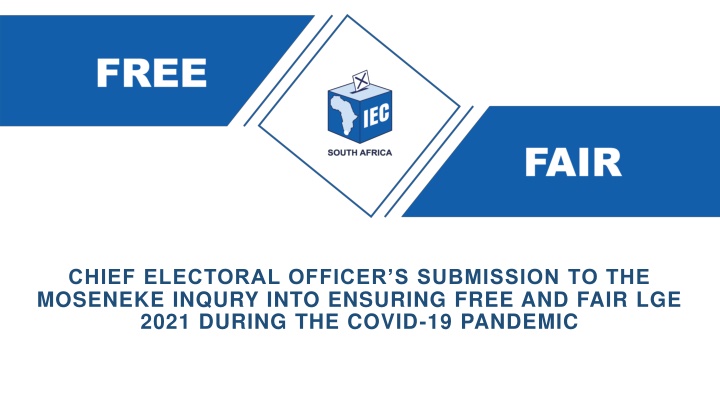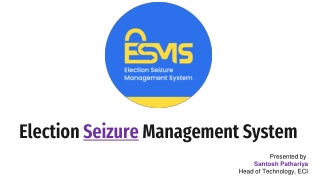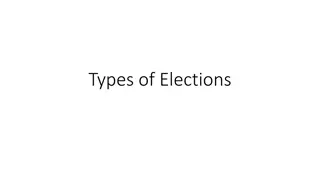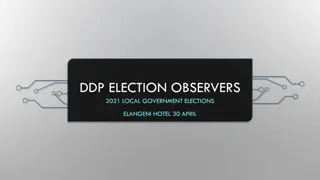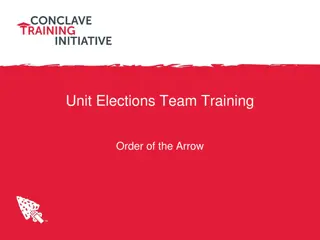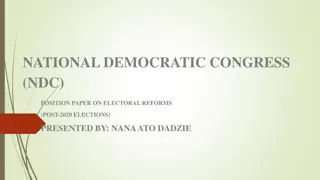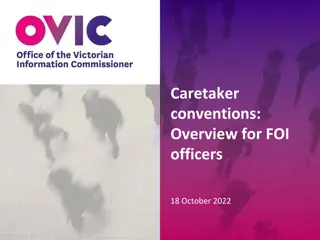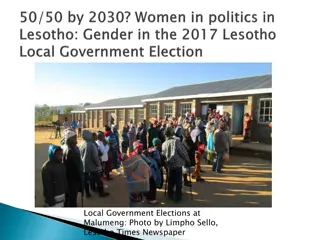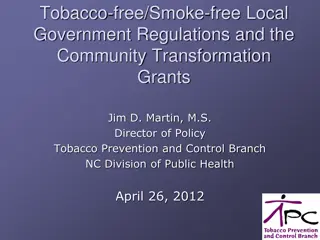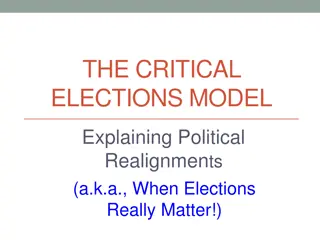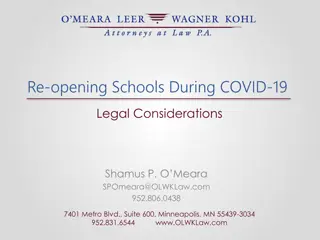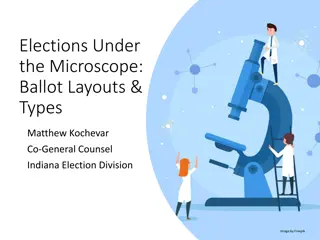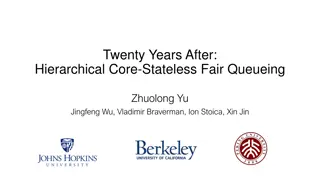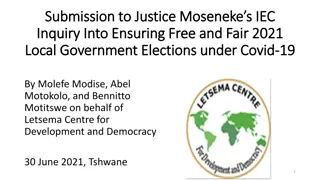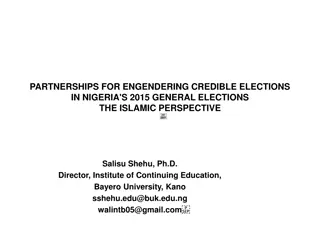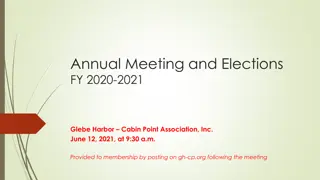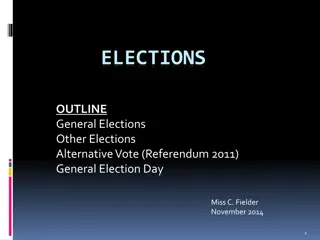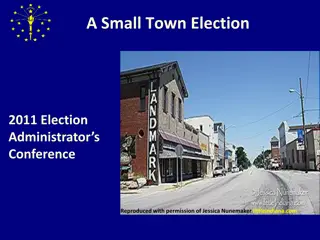Ensuring Free and Fair Local Government Elections 2021 Amid Covid-19
The Chief Electoral Officer presents a submission to the Moseneke Inquiry regarding the challenges of conducting the 2021 Local Government Elections during the Covid-19 pandemic. Emphasizing the constitutional and legal framework, the submission addresses voting protocols, preparations, and the potential impact of Covid-19 on the elections' fairness and integrity.
Download Presentation

Please find below an Image/Link to download the presentation.
The content on the website is provided AS IS for your information and personal use only. It may not be sold, licensed, or shared on other websites without obtaining consent from the author.If you encounter any issues during the download, it is possible that the publisher has removed the file from their server.
You are allowed to download the files provided on this website for personal or commercial use, subject to the condition that they are used lawfully. All files are the property of their respective owners.
The content on the website is provided AS IS for your information and personal use only. It may not be sold, licensed, or shared on other websites without obtaining consent from the author.
E N D
Presentation Transcript
CHIEF ELECTORAL OFFICERS SUBMISSION TO THE MOSENEKE INQURY INTO ENSURING FREE AND FAIR LGE 2021 DURING THE COVID-19 PANDEMIC
Contents Contents 1. Constitutional and Legal context 2. Standard for Free and Fair Elections 3. Preparations for 2021 Local Government Elections 4. Voting Protocols under Covid-19 5. Concluding Remarks 2
INTRODUCTION AND CONSTITUTIONAL CONTEXT The Republic of South Africa is a sovereign and democratic state founded on a number of values, including universal adult suffrage, a national common voters roll, regular elections and a multi-party system of democratic government, to ensure accountability, responsiveness and openness. The Bill of Rights guarantees the right of every citizen to free, fair and regular elections for any legislative body established in terms of the Constitution, in this case 213 Municipal Councils across the country. 3
INTRODUCTION AND CONSTITUTIONAL CONTEXT CONTINUED The Constitution requires the Commission to manage elections of municipal legislative bodies in accordance with national legislation, to ensure that those elections are free and fair, and to declare the results of those elections within a period that must be prescribed by national legislation and that is as short as reasonably possible. 4
INTRODUCTION AND CONSTITUTIONAL CONTEXT - CONTINUED Properly construed, the Constitution and the Municipal Structures Act require that a general election of all Municipal Councils must be held within 90 days of the date of the expiry of the term of Municipal Councils. Since the last general local government elections took place on 3 August 2016, the current term of all municipal councils in the Republic will expire on 3 August 2021, and general local government elections will have to be held by 1 November 2021 to elect new municipal councils. 5
COVID-19 AND POSSIBLE IMPACT ON LGE 2021 For the first time since its establishment, the Commission is faced with the prospect of conducting general elections in the midst of a global pandemic, i.e., the Covid-19 pandemic currently ravaging the world. Concerns have been expressed by some political parties that the LGE 2021 may not be free and fair given the impact of Covid-19 and the measures taken by the government, to curb the continued spread of the pandemic. It is for this reason that the Commission has appointed Justice Moseneke to inquire into, report on and make recommendations regarding the likelihood that the Commission will be able to ensure that LGE 2021 will be free and fair in view of the challenges posed by the pandemic and the measures promulgated by the Government to curb the spread thereof. 6
FREE AND FAIR ELECTIONS There is no binary choice between timeously holding the forthcoming general elections and ensuring that they are free and fair. The Constitution requires both, hence the need for this Inquiry. The most important elements of a free and fair election include the following: 7
FREE AND FAIR ELECTIONS CONTINUED Every citizen who is entitled to vote should, if possible, be registered to do so, and no person who is not entitled to vote should be permitted to do so. Insofar as municipal elections have a territorial component, the registration of voters must be undertaken in such a way as to ensure that only voters in that area are registered and permitted to vote. Every eligible citizen should have the right to participate in elections as a candidate and to seek public office. Political parties and candidates should be able to compete with one another on relatively equal terms. 8
FREE AND FAIR ELECTIONS CONTINUED Political parties and candidates should be free to canvass, to advertise, and to engage in the activities normal for a person seeking election. Voters should have access to reliable information about the elections and the parties and candidates contesting the same and must be able to vote free from intimidation and similar hindrances. The Commission should apply the relevant electoral laws to all participants without fear or favour and should ensure that all the participants can compete without any undue hindrance or obstacle occasioned by the manner in which the preparations for the election have been undertaken or the way in which the election has been conducted. 9
THE COMMISSIONS PREPARATIONS FOR LGE 2021 In the discharge of its obligations to conduct the 2021 General Local Government Elections ( LGE 2021 ), the Commission has been hard at work preparing to ensure that it is able to conduct LGE 2021 within the constitutional time frame. The Commission is doing everything within its power to ensure that it is technically ready to discharge its obligation in respect of regularity of municipal elections. Some of these measures are highlighted below. 10
LEGISLATIVE ENVIRONMENT In the discharge of its obligations to continually review electoral legislation and proposed electoral legislation and to make recommendations in connection therewith, the Commission was instrumental in the passing of the Electoral Laws Amendment Act, 2021, intended to amend certain legislative provisions in preparation for LGE 2021. In consequence to the Electoral Laws Amendment Act, 2021, the Commission has caused draft amendments to the various affected regulations to be prepared and these will be promulgated by the Commission contemporaneously with the Act s commencement notice 11
WARD AND VOTING DISTRICT DELIMITATION The Commission delimits voting districts for the whole of the territory of the Republic, thus creating manageable geographic entities in order to facilitate registration and electoral processes. A voter is required to register to vote in a voting district within the ward in which she or he is ordinarily resident. Each voting district is serviced by one voting station. A registered voter will only find her or his name on the voting district segment of the voters roll at which she or he applied to register to vote. The MDB handed the final boundaries to be used for the elections over to the Commission on 1 December 2020. Consequently, the Commission has delimited 23,151 voting districts, as increase of 226 since NPE 2019. 12
VOTER REGISTRATION There are currently 25,789,566 registered voters whose names appear on the voters roll. Only a voter who applied for registration prior to the proclamation of an election date may vote in the election concerned. Accordingly, the elections will only be formally called after the registration weekend in order to afford eligible citizens maximum opportunity to register to vote or change their registration details. Given the steps that have to be taken prior to voting day, the elections must be proclaimed by not later than 2 August 2021. 13
VOTER REGISTRATION CONTINUED Due to budgetary constraints the Commission is planning to hold only one registration weekend prior to the elections, which is currently scheduled for 17 and 18 July 2021. Once the elections have been called, the CEO must make a provisionally compiled voters roll available for inspection between 4 and 11 August 2021. Interested persons may lodge objections in terms of section 15 of the Electoral Act in respect of the provisionally compiled voters' roll and the Commission will consider and decide these objections by 18 August 2021. 14
VOTING STATION PROCUREMENTS 23 151 voting stations will be in use over the registration weekend and on voting day. The Commission s project to assess the suitability of voting stations and the conclusion of lease agreements in respect of these voting stations commenced on 1 May and will conclude on 30 June 2021. 15
ELECTION LOGISTICS The Commission operates a computerised system known as the LIS, which underpins the planning, monitoring, management and control of electoral materials. Using the LIS, a Bill of Materials ( BOM ) is created for each electoral event and detailed material requirement plan lists are produced to enable the accurate procurement, distribution and allocation of electoral materials per province, municipality and voting district. The Commission has finalised the BOM for the registration weekend and elections. The Commission is on track to have all the required materials at hand for the registration weekend. 16
OUTREACH It is important to galvanise the nation and build awareness of LGE 2021 to reach each and every eligible citizen and encourage them to register to vote and to vote on voting day. The mass media plays an integral role in this regard. A survey conducted by the HSRC at the Commission s behest indicates that 73% of respondents received information relating to elections via TV, 57% via radio, 43% via newspapers and posters and 23% through their contacts. The Commission has not been oblivious of the shift from traditional media to digital and social media as a source of news and information, especially among the youth who are disproportionally underrepresented on the voters roll. 17
OUTREACH CONTINUED The Commission has had to adapt its Outreach strategy to take account of these developments, hence it has directed more of its media spend towards digital and social media platforms. Taking the results of the survey into account, the Commission has segmented its media spent on the following basis: 33% has been allocated to TV placements, 22% to radio placements, 17% for outdoor advertising, 6% to print advertising and 19% to digital advertising, including social media. The Commission has been meeting with key electoral stakeholders in preparation of LGE 2021. These meetings are ongoing. 18
VOTER EDUCATION The Commission takes a multi-modal approach to discharging its obligation to promote voter education in an attempt to reach all eligible citizens across the country. One of the voter education modalities adopted for LGE 2021 is a series of short videos to be posted on social media platforms. These videos will cover such topics as how to register to vote ; Voting in Covid times intended to assure voters of their safety during registration and voting by explaining the measures taken by the Commission to ensure the safety of voters during these processes. 19
VOTER EDUCATION CONTINUED In addition, the Commission s civic and democracy education ( CDE ) project for the forthcoming elections has already commenced in some provinces with community radio programmes, where a member of the Commission s staff acts as the guest presenter of the CDE content. The community radio station programmes are expected to be live until end of October 2021 so that they cover all the important electoral phases. 20
LAUNCH OF LGE 2021 The election launch event was conducted successfully on 9 June 2021 at the Sandton Convention Centre. The event was well attended and went according to plan. 21
RECRUITMENT OF ELECTION OFFICERS The Commission has completed the process of recruiting Municipal Electoral Officers for each of the 213 municipalities. It has also completed the recruitment of 52 090 voting officers for the registration weekend. The training of registration staff commenced on 4 June and will conclude on 15 July 2021. 22
TECHNOLOGY Due to the increasing movement of information to digital platforms, the Commission commissioned a complete redesign of its official website (www.elections.org.za) to conduce to easier navigation. The new and improved website went live on 1 May 2021 and contains information for voters, registrants, political parties and candidates, as well as information about elections. The portable eZiskan (Zip-zip) units hitherto used by the Commission for voter registration and elections have reached the end of their useful lifespan. The Commission has procured 40 000 new VMDs (which have the ability to transmit voter registration and participating data to the Commission s servers in real time) to support voter registration and voters roll management at voting stations on voting day. Delivery of these VMD is in time for the registration weekend and on schedule. 23
PARTY LIAISON The Commission has established party liaison committees for the national, provincial and municipal spheres. Party liaison committees serve as vehicles for consultation and co- operation between the Commission and the represented parties on all electoral matters, aimed at the delivery of free and fair elections. 24
PARTY REGISTRATION Only appropriately registered parties may contest LGE 2021 by way of party lists. Registered parties are also able to nominate ward candidates. The registration of political parties is a continuous process. There are currently 605 registered political parties, of which 287 are registered on a national level and 318 on a municipal level. The onus remains on political parties who wish to contest LGE 2021 to ensure that their application is lodged with the chief electoral officer timeously and that the political party is duly registered before the process for candidate nomination for LGE 2021 commences. 25
ANTI- COVID-19 MEASURES ADOPTED BY THE COMMISSION Once the virus was detected in South Africa, the Commission suspended all by-elections until government eased the lockdown restrictions to level 1 wef from 21 September 2020. On 11 November 2020 ( SuperWednesday ) the Commission conducted all the by-elections that had been delayed by the pandemic, in which 95 wards were contested across 55 municipalities in all provinces, using 455 voting stations. In preparing for the Super Wednesday by-elections the Commission, in consultation with the NPLC, compiled COVID-19 voting protocols to ensure not only the free and fair elections are held, but that they are also held in a safe and healthy manner by ensuring that voters and officials take the necessary precautions during the voting process to limit their risk of exposure to the virus. 26
ANTI- COVID-19 MEASURES ADOPTED BY THE COMMISSION - CONTINUED The efficacy of these measures was successfully tested during the Super Wednesday by-elections of 11 November 2020 and those held on 9 December 2020, before the second wave of the pandemic in December 2020 forced an adjustment of the alert level to Alert Level 3, leading to the postponement of by-elections scheduled for January, February and March 2021. 27
CURRENT COVID-19 PROTOCOLS These voting protocols have since been adjusted as new lessons are learnt, and the current protocols are: In the morning before voting starts, the presiding officer must defog the voting station venue; Voting officers will be provided with PPE for use at the voting station and during special vote home visits; Voters are encouraged to bring their own pens for marking the ballot papers in order to avoid the sharing of pens. However, pens provided by the Commission will be sanitised after each single use; 28
CURRENT COVID-19 PROTOCOLS - CONTINUED The queue walker must ensure social distancing is kept at 1.5 meters apart. Adhesive tapes or any voting specific measures to be used to enforce social distancing. She or he must also ensure that all voters in the queue are wearing face masks and make regular checks along the queue and offer assistance where necessary; The door controller must ensure that every voter entering the voting station is wearing a face mask, must sanitise each voter s hands prior to entering the station and 29
CURRENT COVID-19 PROTOCOLS - CONTINUED Door controller must also control access of voters into the voting station to limit the number of persons in the voting station at any given time and checks the voter s identity document and directs the voter to the next step; 30
CURRENT COVID-19 PROTOCOLS - CONTINUED The fingernail of the voter is marked without touching the voter using a disposable bud, which is immediately thereafter discarded in the disposable bag provided. Protocols on social distancing and sanitising of hands applies to all party agents and observers that enter voting station. While counting procedures remain unchanged, officials and party agents need to observe social distancing at all times 31
CURRENT COVID-19 PROTOCOLS - CONTINUED Futhermore, officials must make use of a new set of rubber gloves for the count, as well as sanitise hands at the end of voting/start of counting, and at end of counting process together with wiping of all surfaces prior and after use. Each party or candidate is allowed two agents per voting station and one party agent per home visit team. In the event where the voting station cannot accommodate two agents per party, the presiding officer, in consultation with the parties, must agree on one agent per party on a rotational basis. 32
ELECTION FUNDING The Commission has not been immune to the austerity measures adopted by the government in the past few years. The Commission s 2020/21 and 2021/22 baseline budgets were cut by R118, 4 million and R174, 7 million, respectively, during the 2021 Adjustment Budget and MTEF processes. The principal casualty of these budget cuts has been the cancellation of one of the two registration weekends which customarily take place prior to an election. The pandemic has resulted in additional unbudgeted costs such as PPE for voting officials and other protective aids, with a total cost of R129 350,364,00. 33
ELECTION FUNDING - CONTINUED Consultations between the Commission and National Treasury regarding additional funding are underway. One of the suggestions put forth during the Commission s consultations with stakeholders was to extend special voting days to three to lighten congestion. Such an extension would require additional financial resources 34
CONCLUSION Conducting a general election is a huge logistical undertaking involving many moving parts. This submission indicates that the Commission has pulled out all the stops to ensure that it will be technically ready to conduct LGE 2021. In this regard, electoral supplies, logistics and infrastructure have been arranged, the necessary legal framework for the orderly conduct of elections is in place, political boundaries have been determined, electoral staff has been recruited and are undergoing training. An election is ultimately about people. The Commission has set out the measures that it will undertake to ensure that voter participation in the registration drive and on voting day will not expose them to increased risks, and the measures envisaged to re-assure voters that this is in fact the case. 35
